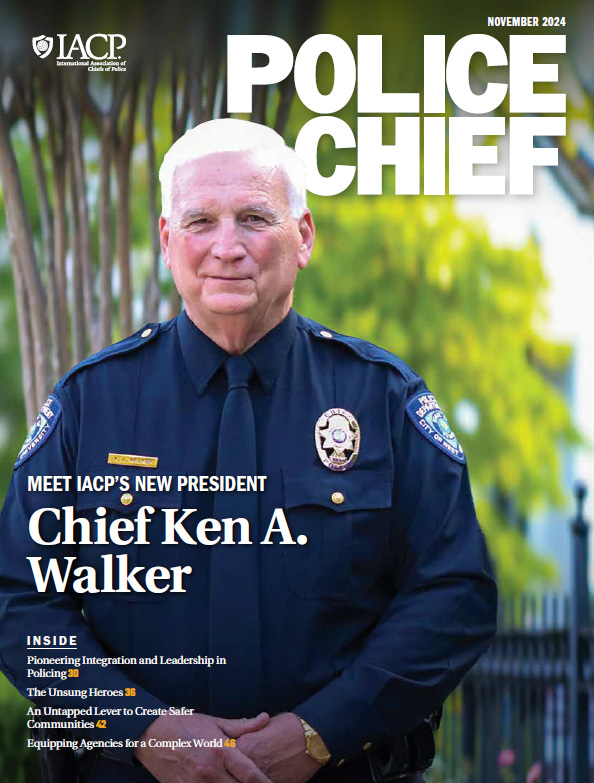Since 1992 the International Association of Chiefs of Police has held a series of highly successful national policy summits that address emerging issues confronting the law enforcement profession. Over the last 15 years, the IACP has addressed such issues as murder, violent crime, child protection, youth violence, hate crime, and criminal intelligence sharing.
Each of the summits on these issues, and the comprehensive reports that followed, have provided the IACP and the law enforcement profession with a clearer understanding of the issues confronting us and have led to the development of a variety of innovative approaches and solutions.
Unfortunately, although police agencies around the world can certainly learn from these summit reports, the topics addressed at these summits have been primarily those that are confronting the law enforcement community in the United States.
The time has come to expand the focus of our efforts and provide for greater international involvement. To that end, the International Association of Chiefs of Police will convene a two-day global policing summit that will address the policing challenges that best affect the increasingly pervasive and exigent threat posed by global terrorism and radicalization and the leadership challenges facing policing in the 21st century.
With membership from 99 countries and a growing international portfolio, the IACP is uniquely well positioned to host this international summit. Building on the success of the IACP World Regional Conference series, the IACP Global Policing Summit will create a comprehensive, tailored action agenda dedicated solely to combating global terrorism. Specifically, the summit will have the following objectives:
- Share best policing practices that can prevent terrorist acts and respond to known terrorist threats
- Identify effective strategies for helping communities respond to the radicalization of youths in support of terrorist activity
- Define actions that can lead to higher standards of global police cooperation in addressing these threats.
To help guide this important effort, I have appointed as summit co-chairs three highly respected and well-known individuals in the global law enforcement community. Each brings a wealth of expertise and wisdom to the success of this event.
- Ambassador Charles R. Stith is the director of the African Presidential Archives and Research Center at Boston University. He was U.S. ambassador to Tanzania in the traumatic period after the August 1998 bombing of the U.S. embassy in Dar es Salaam, Tanzania’s capital.
- Dr. Lee P. Brown, former president of the IACP, is president of Brown Group International. He has served as mayor of Houston, Texas; chief of police in Atlanta, Georgia; police commissioner of New York City; and director of the U.S. Office for National Drug Control Policy.
- Brigadier General Dana A. Simmons is the commanding general of the U.S. Air Force Office of Special Investigations.
Joining the summit co-chairs in guiding the planning and development of the IACP Global Policing Summit are the members of the IACP International Policing Division Steering Committee under the astute leadership of IACP International Vice President Tom Driessen. Committee members represent the seven IACP World Regional Offices, 17 countries, and numerous international police organizations.
Given the challenges posed by such a complex topic, the summit will provide a forum for thoughtful discourse and agenda-setting action. In addition to several keynote addresses from well-known speakers setting forth the challenges facing law enforcement, the summit will provide attendees with a dynamic, interactive environment where they can take the following steps:
- Identify policing strategies that work and have high impact against global terrorism
- Exchange information regarding best practices
- Identify weaknesses in approach and voids that need to be filled
- Develop future actions to increase the effectiveness of policing around the globe in meeting the terrorist threat
This summit will provide the leadership of the international law enforcement community with the opportunity to unite and forge a new way forward for our profession. This could not be a more critical priority for our agencies or the people we protect. Because terrorist networks are truly global, the international law enforcement response must be equally global in its strategy to detect, deter, and prevent terrorist acts. The summit’s conclusion will mark the beginning of a larger, ongoing dialogue among the international law enforcement community.
The 21st century holds unprecedented challenges for police executives worldwide; the IACP Global Policing Summit will open a global dialogue among police executives about how best to address the complex challenges posed by global terrorism. It is becoming clear that policing strategies that support strong communities and establishment of collaboration with these communities are the best terrorism prevention strategy. Moreover, this international forum will gather and present senior executive police leadership with a rich opportunity to discuss, shape, and forge actions to bolster global police cooperation in meeting this expanding threat.


